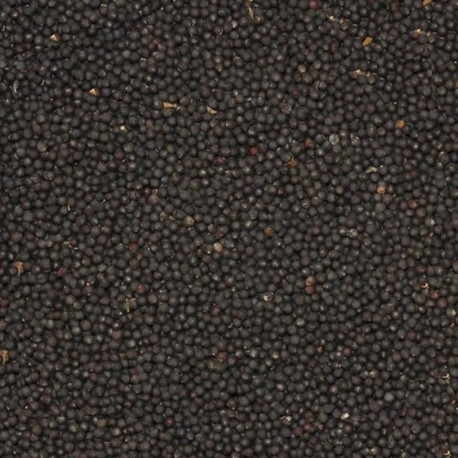



Reference: NAVETTE-KG
The shuttle is almost similar to rapeseed, the difference lies in the bitter flavor of the latter. The shuttle seed is rich in protein and favorable to the improvement of song, so it is interesting during the breeding season in canaries. However, as this seed is quite fatty, we advise you not to exceed 10% of your shuttle mixture for colored canaries or posture canaries. For singing canaries, the shuttle softens the song and can therefore be used at 30% of the mixture: in the latter case, we advise you to accompany your bird's diet with liver support.
The shuttle is almost similar to rapeseed, the difference lies in the bitter flavor of the latter. The shuttle seed is rich in protein and favorable to the improvement of song, so it is interesting during the breeding season in canaries. However, as this seed is quite fatty, we advise you not to exceed 10% of your shuttle mixture for colored canaries or posture canaries. For singing canaries, the shuttle softens the song and can therefore be used at 30% of the mixture: in the latter case, we advise you to accompany your bird's diet with liver support.
Common names:
Wild teasel, Birds' cabaret, Venus' basin, Wolf's comb [Fr], Grote kaardebol [Nl], Wilde Karde [De], Cardo dei lanaioli, Scardaccione selvatico [Il], Cardencha, Cardo de cardador [Es].
They have the property of binding to minerals such as calcium, iron and zinc and making them less bioavailable.
Oatmeal or peeled oats are used in the composition of the basic mixtures of canaries and hooked beaks especially during the breeding and feeding period.
Its protein level is quite low, but it is a seed rich in energy.
Crude protein: 13%
Fat: 8%
Carbohydrates: 68%
Phosphorus: 0.4%
Calcium: 0.09%
Hemp seeds are highly nutritious and contain more essential fatty acids (EFAs) than any other source and are in second place, after soya, for their richness in highly digestible proteins, of high biological value. They are particularly recommended during the breeding seasons in order to stimulate the reproductive instinct of birds.
Birds like to remove the shells from peanuts and then eat the peanuts. Peanuts are a source of energy, which is very important for the long winter months.
Unpeeled peanuts can be given to parrots as a treat.
Clover stimulates the immune system and slows down cellular ageing through its excellent antioxidant properties. Rich in vitamins B, C, E and provitamin A.
Paddy rice seed or raw rice is perfectly suitable for exotic birds with strong beaks such as the Java sparrow and Asian-origin birds. This seed is also appreciated by parakeets, parrots, and exotic doves.
Millet is used in the diet of all birds: straight beaks and hooked beaks. In clusters, it's a delicacy they love.
Millet in clusters has a good protein and carbohydrate content and it also contains a large number of amino acids. Ideal to distract your birds and thus avoid pecking (pulling feathers).
We advised to give red millet for exotic birds. It is richer in protein than yellow millet.
Radish seeds have antioxidant, detoxifying, draining, and decongestant properties.
Peeled peanuts are treats highly appreciated by parrots.
They should be distributed sparingly as they are rich.
An ideal food to fill your feeders for wild birds, they will provide the necessary fat for birds to get through the winter more easily.
A favourite of tits and a real delicacy for many birds.
Striated sunflower is the basic seed of any parrot mixture. It is also used in mixtures for parakeets and exotic doves.
It is also the favorite food of your outdoor birds during the winter period! Ideal for feeding the birds in your garden.
Practical information for giving sunflower seeds to birds in your garden:
Remember to regularly clean the feeders of your outdoor birds so that diseases and bacteria do not thrive.
Also consider setting feeders high up to prevent predators (such as cats, foxes, etc.) from targeting birds when they are eating.
Peeled peanuts are very popular treats for parrots.
They are to be distributed sparingly because they are rich.
Ideal food to fill your wild bird dispensers, they will bring the necessary fat to the birds to spend the winter more easily.
The favorite of chickadees and a real treat for many birds.

The shuttle is almost similar to rapeseed, the difference lies in the bitter flavor of the latter. The shuttle seed is rich in protein and favorable to the improvement of song, so it is interesting during the breeding season in canaries. However, as this seed is quite fatty, we advise you not to exceed 10% of your shuttle mixture for colored canaries or posture canaries. For singing canaries, the shuttle softens the song and can therefore be used at 30% of the mixture: in the latter case, we advise you to accompany your bird's diet with liver support.
